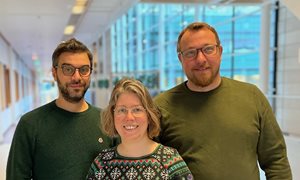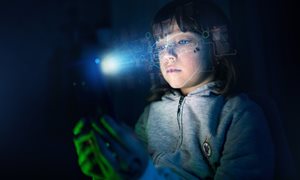
Geert Litjens has been appointed professor of Al for analysis of medical imaging in pathology and radiology at Radboud university medical center / Radboud University. Litjens develops self-learning computer systems, which can analyze all available diagnostics of a patient. This should provide much more information than the current approach per medical specialization.
Care is now organized in medical specializations. A radiologist looks at an MRI scan and then a pathologist evaluates tissue from a biopsy. Both doctors can get support from AI, computer systems that help with the analysis. But the different specialties only then come together in a multidisciplinary consultation. No one looks at all the diagnostics in detail.
Geert Litjens (Venlo, 1985) is developing AI that can analyze and combine all measurements on a patient. These include scans such as MRI, tissue analyses, blood values, clinical chemistry and genetic information. The AI thus focuses on the disease as a whole. ‘An AI system in which you integrate all the information can give more insight into a disease than a pathologist or radiologist by themselves’, Litjens says.
Patterns
The first step is to combine radiology and pathology. Litjens: ‘What you see in a patient with a scan, you can correlate with the analysis of the tissue from that same patient.’ Therefore, he uses AI to look for patterns in thousands of scans and the corresponding tissue analyses that can predict how the prognosis of the patient. He also links the two techniques together: that way, the AI learns which scan belongs to which tissue analysis.
‘Hopefully in the future AI will be able to determine exactly what the tissue looks like based on a scan alone, and biopsies will no longer be necessary’, Litjens says. ‘In prostate cancer or breast cancer, that would save a lot of tedious biopsies, but especially for more difficult places for a biopsy, such as the brain, this is very interesting.’
As a next step, Litjens plans to add other analyses to his AI systems in addition to scans and pathology. For example, genetics and molecular markers are important in breast cancer, and in prostate cancer a doctor looks at markers in the blood. In this way, each disease will have its own AI system.
Career
Geert Litjens studied Biomedical Engineering at TU Eindhoven. He received his doctorate from the Radboudumc in 2015 for his dissertation entitled ‘Computerized detection of prostate cancer in multi-parametric MRI’. During a semester at Case Western Reserve University in Cleveland, he first worked on the fusion of pathology and radiology. After a postdoc at the University of Heidelberg, he started at his current workplace: the Department of Pathology at Radboudumc.
In 2021, Litjens co-founded the spin-off company Aiosyn. Litjens received several grants, including ERC Starting Grant, NWO Vidi and KWF Young Investigator. He is also work package leader in the IMI project BigPicture. The appointment took effect May 1 for a five-year period.
-
Want to know more about these subjects? Click on the buttons below for more news.
More information
Annemarie Eek

wetenschapsvoorlichter






